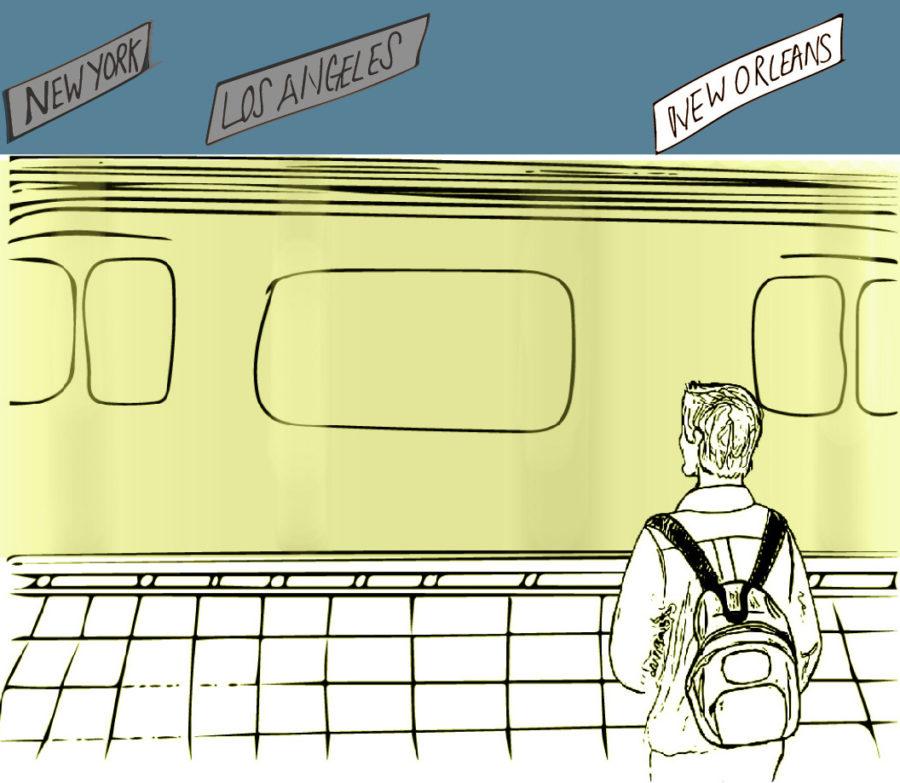Many creatives start in New Orleans, but fewer stay
March 14, 2017
For all of the rich culture and provincial charm of New Orleans, it’s a city that carries with it a stigma of being a transient zone for creative professionals.
New Orleans is well-renowned for its vibrant performing arts and local music scene, but in the wake of Hurricane Katrina and ensuing economic setbacks, a common question posed is if arts and entertainment outlets can serve to catalyze development within the city and retain creative types, or if the greener pastures of creative powerhouses like Austin, Nashville, Los Angeles and New York are too promising to pass up.
The city has made substantial effort to encourage entertainment and media professionals to stay post-Katrina, but is it enough to give traction to a new creative class?
The Mayor’s Office of Cultural Economy said that in the aftermath of Hurricane Katrina, the federal government has spent $51 million dollars in development projects for Louisiana and has offered appealing tax incentives for entertainment industries.
“Since 2002, in the film industry there was a 15 percent transferable tax credit for production in Louisiana and then an additional 10 percent credit for hiring Louisiana residents in locally produced films. In the music industry, there is a 25 percent tax credit for recording and production and an additional 25 percent for music infrastructure development,” said the Mayor’s office.
However, a bill signed by former governor Bobby Jindal in 2015 capped the film tax credits to only $180 million annually, roiling the newly dubbed “Hollywood of the South” by reallocating $70 million dollars away from the entertainment sector to try to help close Louisiana’s glaring
budget deficit.
Structural limitations like these have aspiring professionals setting their sights on other locales like Atlanta and Los Angeles, with higher industry budgets and more substantial tax benefits.
Ella Jacobs, film junior, said that while she loves learning to make films in New Orleans, film is ultimately an industry, and the city is not her fixed destination to enter the fray.
“For a lot of people, filmmaking is such a sexy-sounding field when we tell people what we’re doing for a career, and while it is super exciting, at the end of the day, we’re going to go where the money is. I don’t really think a lot of people like to say that up front,” Jacobs said.
Billy O’ Connell, music industry professor, has lived and worked in a number of these cities through his career as an artist manager and mentioned that the New Orleans creative bubble is challenging to break into.
“It’s a difficult city to establish a scene, the gravitational force here is strong. It’ll take a paradigm shift to undo the complacency fledgling New Orleans artists’ are prone to hold for the local industry and vice versa,” O’Connell said.
Another key problem that plagues the creative class in modern New Orleans is how they continue to live and work within the city as rent rises steeply while wages stagnate.
Metropolitan cities have realized in recent years that it’s imperative to offer affordable housing and benefits to creative types in order to pose as a competitive magnet for the cultural capital they can provide for
the area.
New Orleans is struggling to keep its low to moderate income sector from getting priced out of housing but is now catching up and setting plans to offer subsidized housing, following suit with other major cities.
In 2015, Mayor Mitch Landrieu proposed a plan to build 7,500 affordable housing units specifically addressing “service workers, creatives and culture bearers” as beneficiaries. Non-profit projects like the Ashe Cultural Arts Center in Central City continue to provide cheap housing relative to the tenant’s income, lower than the $1,000 median rent The Data Center reports for affordable housing.
In a journal published by Cathy Lang Liu and Ric Kolenda of Georgia State University, it was decided that even though the city is rife with economic uncertainty, the potential for a flourishing creative class within New Orleans is credible, but has yet to be proven with current policies. The study lists “attracting and retaining young talent, improving quality of life issues for residents and improving business climate as crucial steps towards driving development through creativity.
Jacobs said that creatives don’t need contention with the city to leave professionally, in fact it’s part and parcel with their work
“It’s not that New Orleans isn’t ‘all that’ – it’s a beautiful city, but unfortunately due to the tax cuts, it’s definitely not where it was even just two years ago. I kind of like to think of filmmakers and creatives as nomads – we’re just gonna keep going until we’ve found the right place, settle and then keep moving again,” Jacobs said.








